人教版九年级全册Unit 12 Life is full of the unexpected SectionA Grammar focus 4c课件(共20张PPT)
文档属性
| 名称 | 人教版九年级全册Unit 12 Life is full of the unexpected SectionA Grammar focus 4c课件(共20张PPT) |

|
|
| 格式 | zip | ||
| 文件大小 | 735.9KB | ||
| 资源类型 | 教案 | ||
| 版本资源 | 人教新目标(Go for it)版 | ||
| 科目 | 英语 | ||
| 更新时间 | 2023-02-27 00:00:00 | ||
图片预览

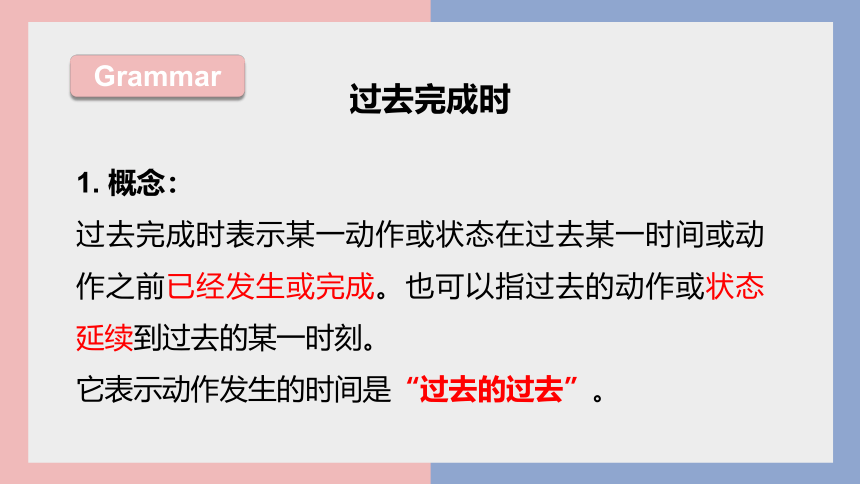
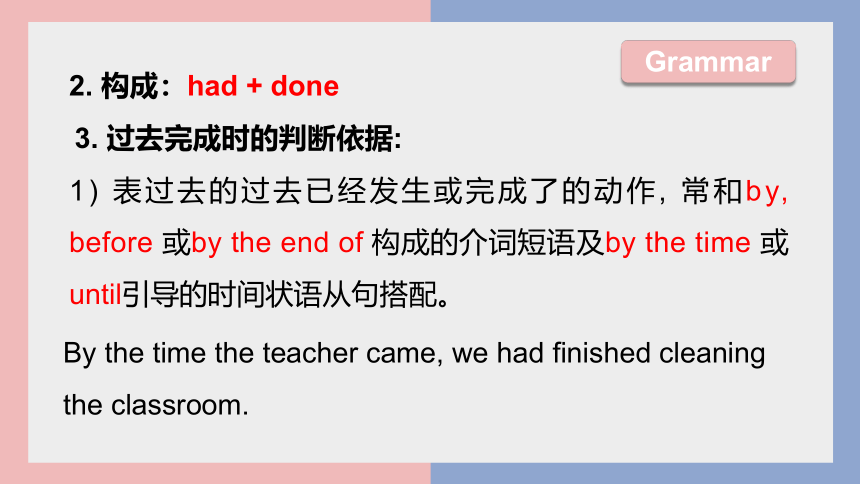
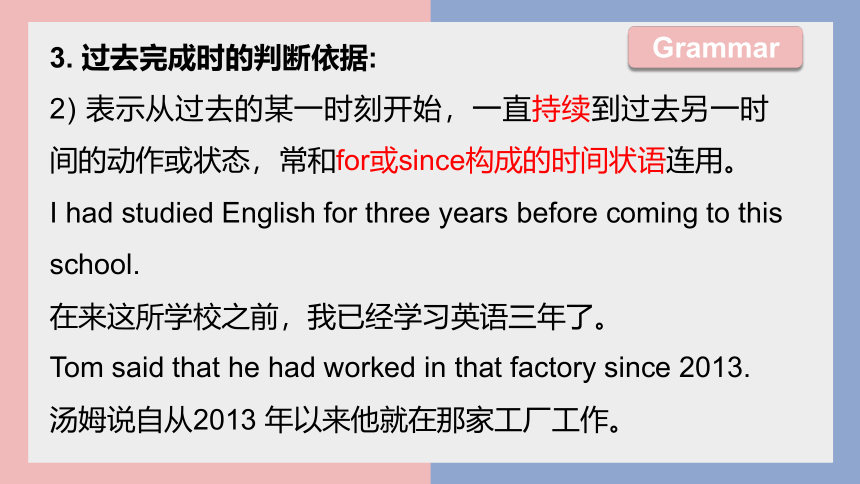
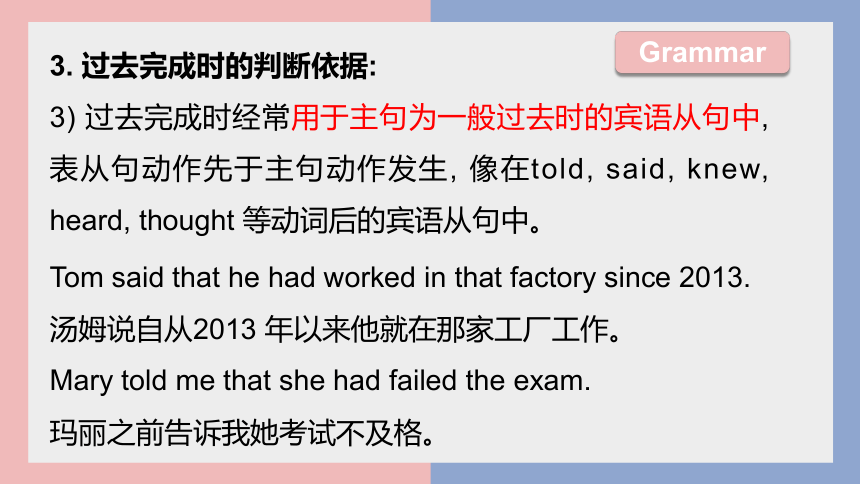
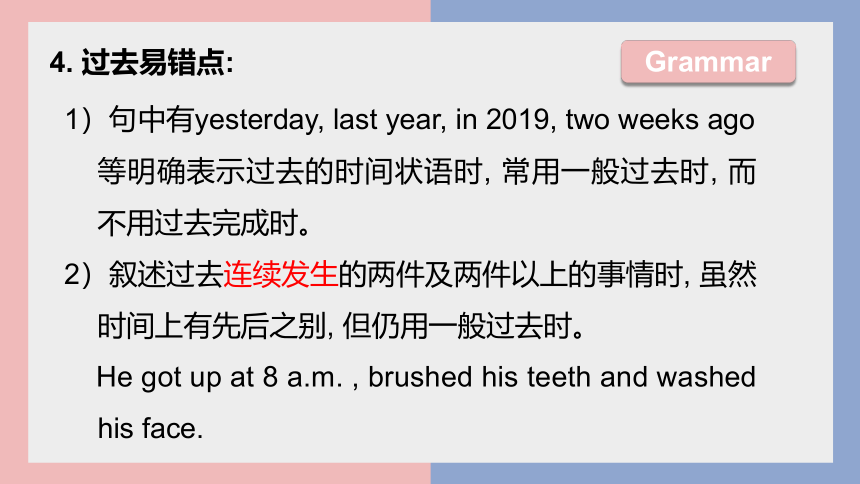
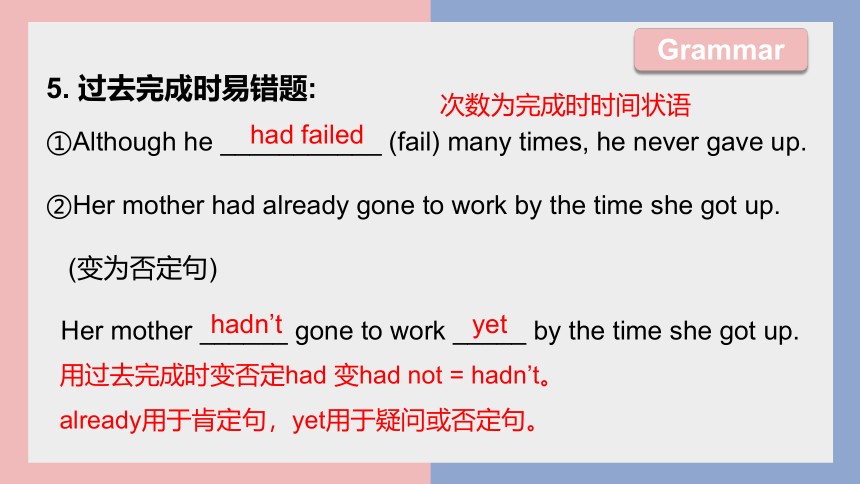
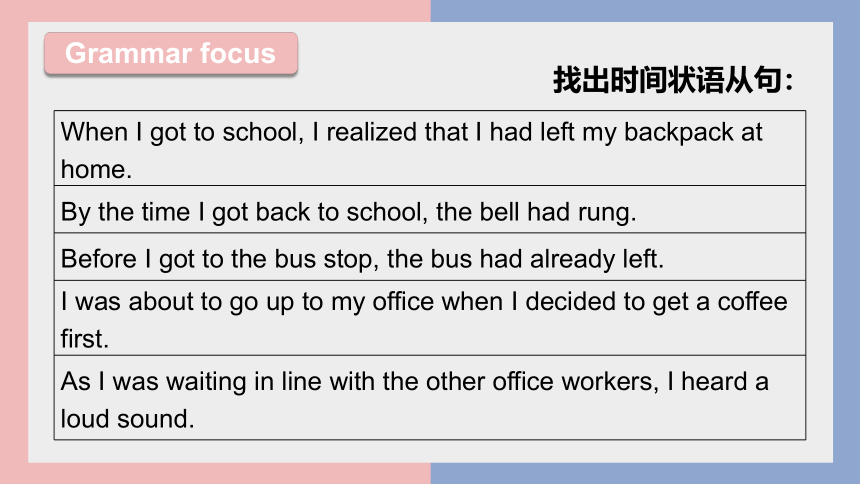
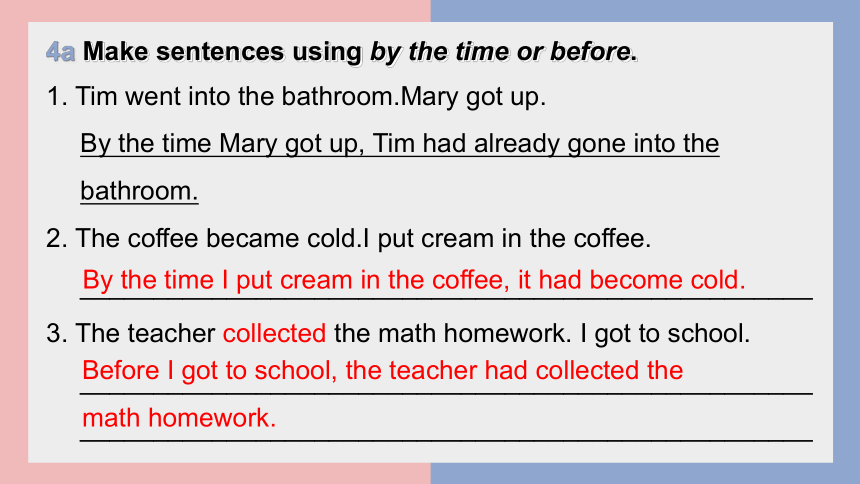
文档简介
(共20张PPT)
Life is full of the unexpected.
Grammar focus
Unit 12
1. 概念:
过去完成时表示某一动作或状态在过去某一时间或动作之前已经发生或完成。也可以指过去的动作或状态延续到过去的某一时刻。
它表示动作发生的时间是“过去的过去”。
过去完成时
Grammar
2. 构成:had + done
3. 过去完成时的判断依据:
1) 表过去的过去已经发生或完成了的动作, 常和by, before 或by the end of 构成的介词短语及by the time 或until引导的时间状语从句搭配。
By the time the teacher came, we had finished cleaning the classroom.
Grammar
3. 过去完成时的判断依据:
2) 表示从过去的某一时刻开始,一直持续到过去另一时间的动作或状态,常和for或since构成的时间状语连用。
I had studied English for three years before coming to this school.
在来这所学校之前,我已经学习英语三年了。
Tom said that he had worked in that factory since 2013.
汤姆说自从2013 年以来他就在那家工厂工作。
Grammar
3. 过去完成时的判断依据:
3) 过去完成时经常用于主句为一般过去时的宾语从句中, 表从句动作先于主句动作发生, 像在told, said, knew, heard, thought 等动词后的宾语从句中。
Tom said that he had worked in that factory since 2013.
汤姆说自从2013 年以来他就在那家工厂工作。
Mary told me that she had failed the exam.
玛丽之前告诉我她考试不及格。
Grammar
1)句中有yesterday, last year, in 2019, two weeks ago 等明确表示过去的时间状语时, 常用一般过去时, 而不用过去完成时。
2)叙述过去连续发生的两件及两件以上的事情时, 虽然时间上有先后之别, 但仍用一般过去时。
He got up at 8 a.m. , brushed his teeth and washed his face.
4. 过去易错点:
Grammar
①Although he ___________ (fail) many times, he never gave up.
②Her mother had already gone to work by the time she got up.
(变为否定句)
Her mother ______ gone to work _____ by the time she got up.
had failed
hadn’t yet
5. 过去完成时易错题:
用过去完成时变否定had 变had not = hadn’t。
already用于肯定句,yet用于疑问或否定句。
次数为完成时时间状语
Grammar
When I got to school, I realized that I had left my backpack at home.
By the time I got back to school, the bell had rung.
Before I got to the bus stop, the bus had already left.
I was about to go up to my office when I decided to get a coffee first.
As I was waiting in line with the other office workers, I heard a loud sound.
Grammar focus
找出时间状语从句:
4a Make sentences using by the time or before.
1. Tim went into the bathroom.Mary got up.
By the time Mary got up, Tim had already gone into the bathroom.
2. The coffee became cold.I put cream in the coffee.
__________________________________________________
3. The teacher collected the math homework. I got to school.
__________________________________________________
__________________________________________________
By the time I put cream in the coffee, it had become cold.
Before I got to school, the teacher had collected the math homework.
4. I completed the work for my boss. The workday ended.
______________________________________________
______________________________________________
5. The movie started.I arrived at the cinema.
________________________________________________
6. My mother finished making the apple pie. I got home from
my language course.
_____________________________________________
_______________________________________________
By the time I arrived at the cinema, the movie had started.
By the time I got home from my language course, my
mother had finished making the apple pie.
Before the workday ended, I had completed the work
for my boss.
4b Fill in the blanks with the correct forms of the words in the box.
rush out forget arrive at go into show up find out
1. By the time I arrived at the party, everyone else ________ already ______________.
2. When he put the noodles into a bowl, he realized he _____________ to add the green beans.
had
showed up
had forgotten
3.By the time my mother came back from the market, I _____
already ___________ of the door to go to my piano lesson.
4.Before she got to the airport, she _____________ about
the earthquake.
5.When she______________ the movie theater, she remembered she had forgotten to feed her dog.
6.Before she got a chance to say goodbye, he _____________
the building.
had
rushed out
had found out
arrived at
had gotten into
rush out forget arrive at go into show up find out
4c Write two true statements and one false statement about your day yesterday. Then ask your classmates to guess the false statement.
1. By the time I left for school in the morning,
___________________________________________________
2. By the end of the school day,
_________________________________________________
3. By dinner time, I _____________________________________
I realized that I had left my keys at home.
I had already finished my homework.
had made the egg soup.
22. collect v. 收集;收藏;聚集;募集;接走
My hobby is collecting stamps.
A crowd began to collect in front of the restaurant.
一大群人开始聚集在这家餐厅前面。
What day do they collect the rubbish
他们哪天来收垃圾?
Language points
22. collect v. 收集;收藏;聚集;募集;接走
collect evidence / information 收集证据、信息
collect one’s thoughts = collect oneself 镇定一下,心平气和
collect / raise money 募集资金
collection n . 收藏;藏品
collector n . 收藏家;收藏者
Language points
23. by the end of + 时间名词 在(某时间点) 以前
根据of 之后的时间不同, 句子选用相应的时态:
(1) 接表示将来的时间, 句子用一般将来时。
By the end of next month, I will finish reading the book.
到下个月底, 我将读完这本书。
Language points
(2) 接表示现在的时间, 句子用现在完成时。
By the end of this week, my sister has learned five English songs. 到这周末, 我妹妹学了五首英语歌曲。
(3) 接表示过去的时间, 句子用过去完成时。
By the end of last year, thousands of trees had been planted in this city. 到去年年底, 这个城市有成千上万棵树已被种植。
23. by the end of + 时间名词 在(某时间点) 以前
根据of 之后的时间不同, 句子选用相应的时态:
by the end of “在…之前”, 仅指时间。
at the end of “在…结束时;在…尽头”, 指时间或地点。
in the end “最后;终于”, 位于句首或句末, 表示事情已结束。
Language points
辨析:
By the end of last year, they had seen six English films.
到去年年底, 他们已经看了六部英文电影。
Turn left at the end of the road.
在路的尽头左转。
What decision did she make in the end
最后她做了什么决定?
Language points
THANK YOU
Life is full of the unexpected.
Grammar focus
Unit 12
1. 概念:
过去完成时表示某一动作或状态在过去某一时间或动作之前已经发生或完成。也可以指过去的动作或状态延续到过去的某一时刻。
它表示动作发生的时间是“过去的过去”。
过去完成时
Grammar
2. 构成:had + done
3. 过去完成时的判断依据:
1) 表过去的过去已经发生或完成了的动作, 常和by, before 或by the end of 构成的介词短语及by the time 或until引导的时间状语从句搭配。
By the time the teacher came, we had finished cleaning the classroom.
Grammar
3. 过去完成时的判断依据:
2) 表示从过去的某一时刻开始,一直持续到过去另一时间的动作或状态,常和for或since构成的时间状语连用。
I had studied English for three years before coming to this school.
在来这所学校之前,我已经学习英语三年了。
Tom said that he had worked in that factory since 2013.
汤姆说自从2013 年以来他就在那家工厂工作。
Grammar
3. 过去完成时的判断依据:
3) 过去完成时经常用于主句为一般过去时的宾语从句中, 表从句动作先于主句动作发生, 像在told, said, knew, heard, thought 等动词后的宾语从句中。
Tom said that he had worked in that factory since 2013.
汤姆说自从2013 年以来他就在那家工厂工作。
Mary told me that she had failed the exam.
玛丽之前告诉我她考试不及格。
Grammar
1)句中有yesterday, last year, in 2019, two weeks ago 等明确表示过去的时间状语时, 常用一般过去时, 而不用过去完成时。
2)叙述过去连续发生的两件及两件以上的事情时, 虽然时间上有先后之别, 但仍用一般过去时。
He got up at 8 a.m. , brushed his teeth and washed his face.
4. 过去易错点:
Grammar
①Although he ___________ (fail) many times, he never gave up.
②Her mother had already gone to work by the time she got up.
(变为否定句)
Her mother ______ gone to work _____ by the time she got up.
had failed
hadn’t yet
5. 过去完成时易错题:
用过去完成时变否定had 变had not = hadn’t。
already用于肯定句,yet用于疑问或否定句。
次数为完成时时间状语
Grammar
When I got to school, I realized that I had left my backpack at home.
By the time I got back to school, the bell had rung.
Before I got to the bus stop, the bus had already left.
I was about to go up to my office when I decided to get a coffee first.
As I was waiting in line with the other office workers, I heard a loud sound.
Grammar focus
找出时间状语从句:
4a Make sentences using by the time or before.
1. Tim went into the bathroom.Mary got up.
By the time Mary got up, Tim had already gone into the bathroom.
2. The coffee became cold.I put cream in the coffee.
__________________________________________________
3. The teacher collected the math homework. I got to school.
__________________________________________________
__________________________________________________
By the time I put cream in the coffee, it had become cold.
Before I got to school, the teacher had collected the math homework.
4. I completed the work for my boss. The workday ended.
______________________________________________
______________________________________________
5. The movie started.I arrived at the cinema.
________________________________________________
6. My mother finished making the apple pie. I got home from
my language course.
_____________________________________________
_______________________________________________
By the time I arrived at the cinema, the movie had started.
By the time I got home from my language course, my
mother had finished making the apple pie.
Before the workday ended, I had completed the work
for my boss.
4b Fill in the blanks with the correct forms of the words in the box.
rush out forget arrive at go into show up find out
1. By the time I arrived at the party, everyone else ________ already ______________.
2. When he put the noodles into a bowl, he realized he _____________ to add the green beans.
had
showed up
had forgotten
3.By the time my mother came back from the market, I _____
already ___________ of the door to go to my piano lesson.
4.Before she got to the airport, she _____________ about
the earthquake.
5.When she______________ the movie theater, she remembered she had forgotten to feed her dog.
6.Before she got a chance to say goodbye, he _____________
the building.
had
rushed out
had found out
arrived at
had gotten into
rush out forget arrive at go into show up find out
4c Write two true statements and one false statement about your day yesterday. Then ask your classmates to guess the false statement.
1. By the time I left for school in the morning,
___________________________________________________
2. By the end of the school day,
_________________________________________________
3. By dinner time, I _____________________________________
I realized that I had left my keys at home.
I had already finished my homework.
had made the egg soup.
22. collect v. 收集;收藏;聚集;募集;接走
My hobby is collecting stamps.
A crowd began to collect in front of the restaurant.
一大群人开始聚集在这家餐厅前面。
What day do they collect the rubbish
他们哪天来收垃圾?
Language points
22. collect v. 收集;收藏;聚集;募集;接走
collect evidence / information 收集证据、信息
collect one’s thoughts = collect oneself 镇定一下,心平气和
collect / raise money 募集资金
collection n . 收藏;藏品
collector n . 收藏家;收藏者
Language points
23. by the end of + 时间名词 在(某时间点) 以前
根据of 之后的时间不同, 句子选用相应的时态:
(1) 接表示将来的时间, 句子用一般将来时。
By the end of next month, I will finish reading the book.
到下个月底, 我将读完这本书。
Language points
(2) 接表示现在的时间, 句子用现在完成时。
By the end of this week, my sister has learned five English songs. 到这周末, 我妹妹学了五首英语歌曲。
(3) 接表示过去的时间, 句子用过去完成时。
By the end of last year, thousands of trees had been planted in this city. 到去年年底, 这个城市有成千上万棵树已被种植。
23. by the end of + 时间名词 在(某时间点) 以前
根据of 之后的时间不同, 句子选用相应的时态:
by the end of “在…之前”, 仅指时间。
at the end of “在…结束时;在…尽头”, 指时间或地点。
in the end “最后;终于”, 位于句首或句末, 表示事情已结束。
Language points
辨析:
By the end of last year, they had seen six English films.
到去年年底, 他们已经看了六部英文电影。
Turn left at the end of the road.
在路的尽头左转。
What decision did she make in the end
最后她做了什么决定?
Language points
THANK YOU
同课章节目录
- Unit 1 How can we become good learners.
- Section A
- Section B
- Unit 2 I think that mooncakes are delicious!
- Section A
- Section B
- Unit 3 Could you please tell me where the restroom
- Section A
- Section B
- Unit 4 I used to be afraid of the dark.
- Section A
- Section B
- Unit 5 What are the shirts made of?
- Section A
- Section B
- Review of Units 1-5
- Unit 6 When was it invented?
- Section A
- Section B
- Unit 7 Teenagers should be allowed to choose their
- Section A
- Section B
- Unit 8 It must belong to Carla.
- Section A
- Section B
- Unit 9 I like music that I can dance to.
- Section A
- Section B
- Unit 10 You're supposed to shake hands.
- Section A
- Section B
- Review of Units 6-10
- Unit 11 Sad movies make me cry.
- Section A
- Section B
- Unit 12 Life is full of the unexpected
- Section A
- Section B
- Unit 13 We're trying to save the earth!
- Section A
- Section B
- Unit 14 I remember meeting all of you in Grade 7.
- Section A
- Section B
- Review of Units 11-14
